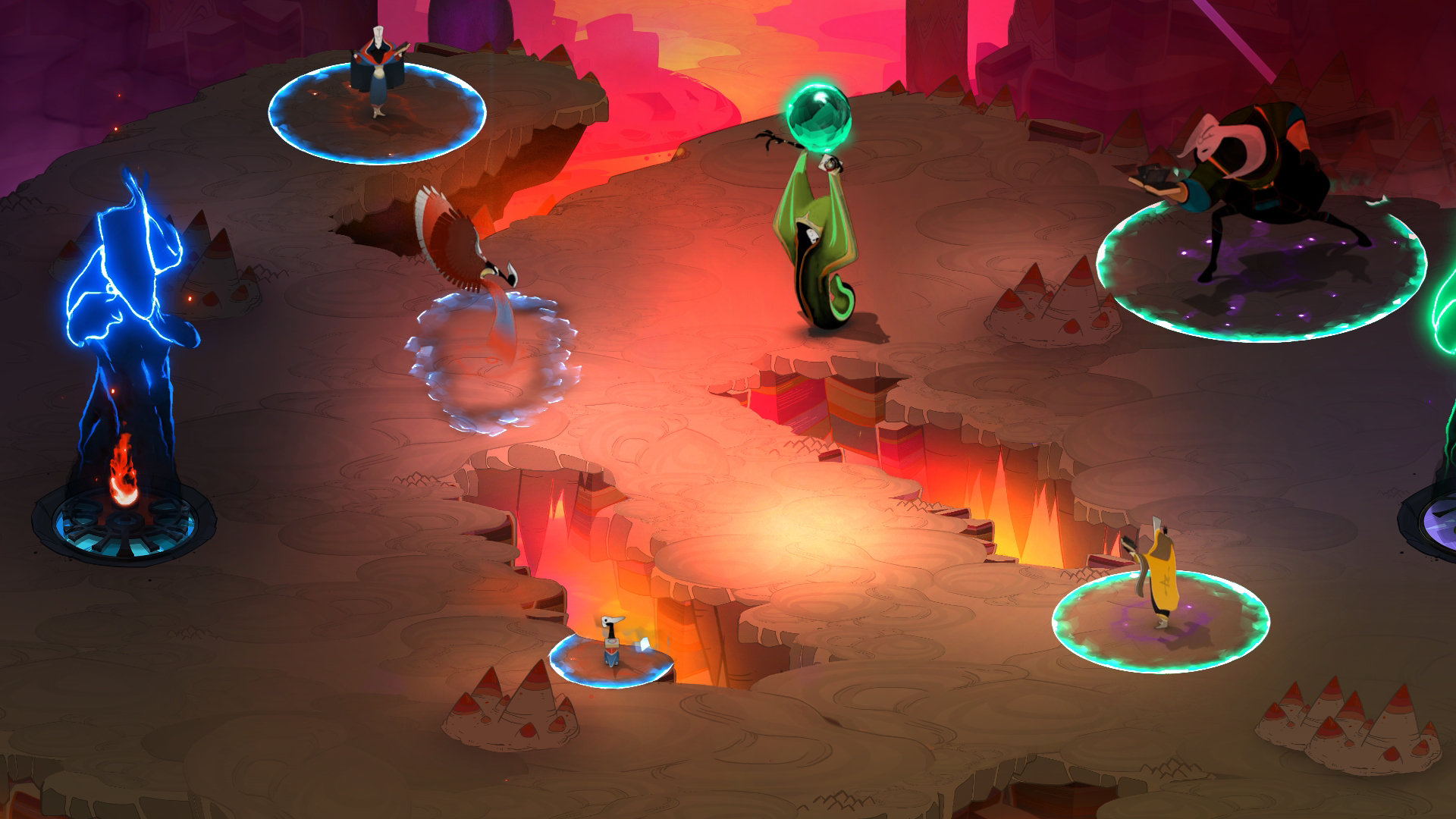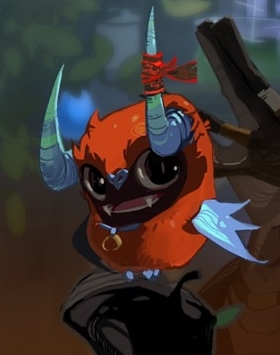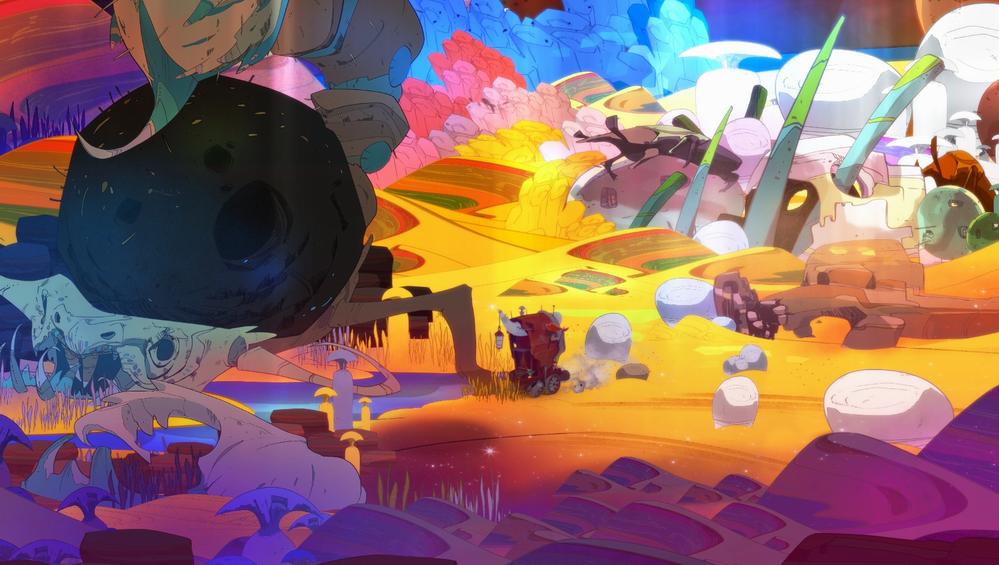Pyre is a storybook with singed edges; stained by spilt ink and filled with blank pages. A pastel-hued cartographer’s fever dream. The feedback from a smoky lute ballad run through a distortion pedal. Most astoundingly, Pyre is a sports game that makes loss just as worth exploring as victory.
What’s defeat when it isn’t?
With save states, we’re always pausing, even when we’re playing. The rapid freezing and thawing of the continue..? continuum allows us to summon up entire universes of possibility to play in. Free of consequence, we bounce planets together ’til the clangs reverberate just right. Schrödinger’s circadian percussion. All outcomes. All states and none. Cancel. Reload. Replay.
Prince of Persia and Braid were not resonant simply because of their time reversal mechanics, but because they granted their protagonists something players have always had at their disposal. Their innovation was to incorporate this most mundane of paratextual certainties – a menu feature that turns hapless adventurers into time manipulating deities – within their fictional worlds.

Pyre rejects perfection. There are no fail states. Defeat is merely another story beat. An experience to brood over with friends whilst sipping drinks and licking wounds. It’s never a mistake to be erased or a history to be rewritten. Through this, the aftermath of competition is explored beyond the numerals of a leaderboard. The baton is never dropped, always passed. The story of Pyre‘s supernatural world is told naturally enough to seed abhorrent vacuums of continuity with starlit forests of branching possibility. It embraces what games would have us forget; The ability to reload a save is not always a boon. Sometimes, it is a flat denial of agency.
At the risk of being crucified on a d-pad: What if I want to lose?
The Ultimate Sacrifice
There were multiple times in Pyre where my opponents victory felt just as worthy as my own. Each member of your triumvirate granted freedom from exile represents the snuffed hopes of an adversary. I always played to win – instincts are hard to shake – but there were times loss carried with it a sigh of relief. Pyre forces us to confront a rarely voiced truth about competition, often smothered in the haze of victory – the joy of triumph is always stolen from another.
The first time you fail a Liberation Rite, Pyre grants you a trophy named ‘Mercy Shown’. You have not lost. You have allowed another to win.
Bittersweet Victories
Even victory in the Liberation Rites is bittersweet. Your fastest friends and most trusted companions are often your strongest teammates. Letting them go means losing a loved one, but sometimes it also means losing a limb. The three must act as one, you are told. Witnessing your anointed compatriot ascend the light to the Commonwealth often means watching your well-honed strategy dissipate into the ether as well. Pyre ensures the presence of the dearly departed is still felt through negative roster space, personal trinkets, and a mechanical penalty to match a felt longing. A percentage increase on the likelihood of a favorable endgame scenario might marry the coldly tangible to the elegiac, but the wounds of separation never quite heal, no matter the outcome.
(Aside: For my last rite, I chose Sir Gilman over Ti’zo. It still haunts me. Ti’zo seemed happy, fishing forever in the Downside, but I’ll never be sure.)

Fare well, orange friend
When I found myself, at Pyre‘s opening, exiled in desolate dunes for the crime of literacy, I wondered why the laws that governed here feared the ability to read so much. It’s a common feature of real world despotic regimes, true, but Pyre seemed to be hinting at something else.
Corporeal Diagesis
Diegesis is primarily used in film studies to denote the separation of narrative elements. Robin Williams’ Genie singing to Aladdin is diegetic, for example, but the Pixies singing Where Is My Mind at the end of Fight Club occurs outside the story space, so it’s non-diegetic.
Toward the end of Pyre, I got all choked up when I realized the vocal tracks were sung by the characters Celest and Tariq. The songs are beautiful, but the reason I got misty eyed on this one was this; I don’t think I’ve ever played a game that fully acknowledged my part in its story. Not as a fourth wall breaking, Kojima-esque shoulder nudging, but as a transportation of will. My own emotional agency occupying Pyre‘s space like a glittering constellation. That the soundtrack itself was woven into the story helped forge a chain between my experience as a manipulator-behind-glass and character both.

This is Pyre‘s heretical literacy; This corporeal diegesis shrinks us down to fill its magic lamp, leaving enough of us outside to trace our fingers along the bronze. We grant our own wishes, but under the condition that each is final. We create this tale as we turn the pages. Reshaping. Rewriting. The spell taking form as it’s cast. The embers of Pyre‘s finale are signs of infinite possibilities, not dying flames. The last image Pyre shows you is of a library, dear reader. A library full of new books, their stories waiting to be written.




[…] On Pyre […]